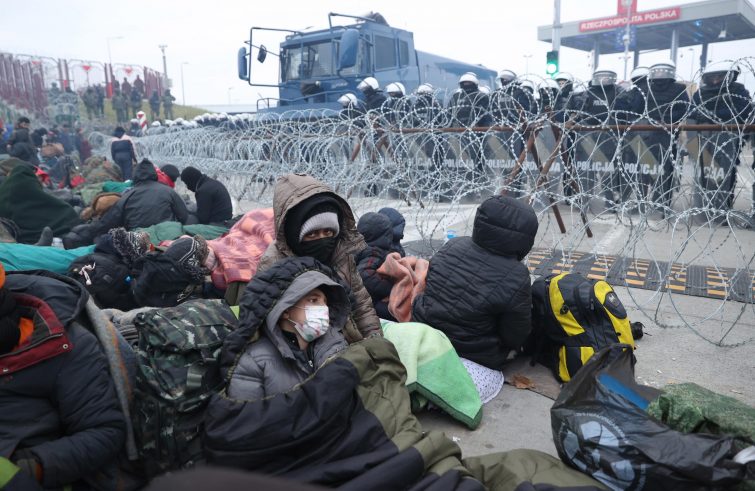
I am presently in Warsaw, Poland. The Kuznica-Bruzgi border crossing into Belarus is approximately 250 km away. Over 4000 migrants – mostly from the Middle East – have tried to cross this border in the past few days.
People are camped on Belarusian territory, guarded by the military.
According to news from yesterday, November 18, the migrants have been transferred to a nearby warehouse storage facility, providing temporary shelter. The latest reports and first videos show quarrels and tension over food and water, and it seems that there is not enough room for everyone inside the facility. On the other side, a human wall of thousands of soldiers, policemen and border guards has been deployed by Poland to impede entry into the country, imposing violent expulsions prohibited by international and European law. Reports on what is being described as yet another “migrant crisis” have been featured in leading newspapers and news programmes for the past ten days.
It all began this summer, when Belarusian airlines started to operate flights from Beirut, Damascus, Istanbul and Iraq to Minsk, and the Belarusian government started to simplify visa proceedings for tourists.
For persons seeking to leave these countries, being allowed to travel to the EU border by plane was a great opportunity, with no particular risks and at a lower cost than other migration routes. Little by little, their initial mistrust of the new route to Europe was replaced by hope.
In the summer, a Syrian youth I work with in Greece started receiving a number of calls from his fellow nationals requesting information about the new route.
Over 4,000 migrants entered Lithuania from Belarus in August and, in response to these numbers, Lithuania started to turn back migrants and started building a wall.
During the same period, Poland increased the number of border guards deployed at the border and set up a barbed wire fence.
Poland declared a state of emergency in a three to five kilometre area from the border with Belarus at the beginning of September.
This means that
to date no one is allowed to enter except residents. And therefore journalists, NGOs, doctors from external locations are not allowed entry.
Only the military, police and border guards can enter. No direct and independent information can be obtained except from people living there or from the migrants themselves.
While justifying itself on the grounds of its responsibility to defend the border from Belarusian interference, the Polish government is pushing back or arresting persons crossing the border. In many cases these persons are worn out after having lived for days in the forests and in makeshift shelters for weeks.
While European leaders are backing the Polish government, Lukashenko has raised the prospect of cutting gas supplies to Poland, while people fleeing countries including Syria, Afghanistan and Iraq are stranded at the gates of a Europe that doesn’t seem to want them.
Meanwhile, people are dying at the border
The funeral of 19-year-old Ahmad Al Hassan from Syria was celebrated two days ago, while today respondents from the Polskie Centrum Pomocy Międzynarodowej rescued a Syrian couple who had been hiding in the forest for a month and a half. The woman informed rescuers that her one-year-old child had died in the forest.
(*)Neos Kosmos APS aid worker









